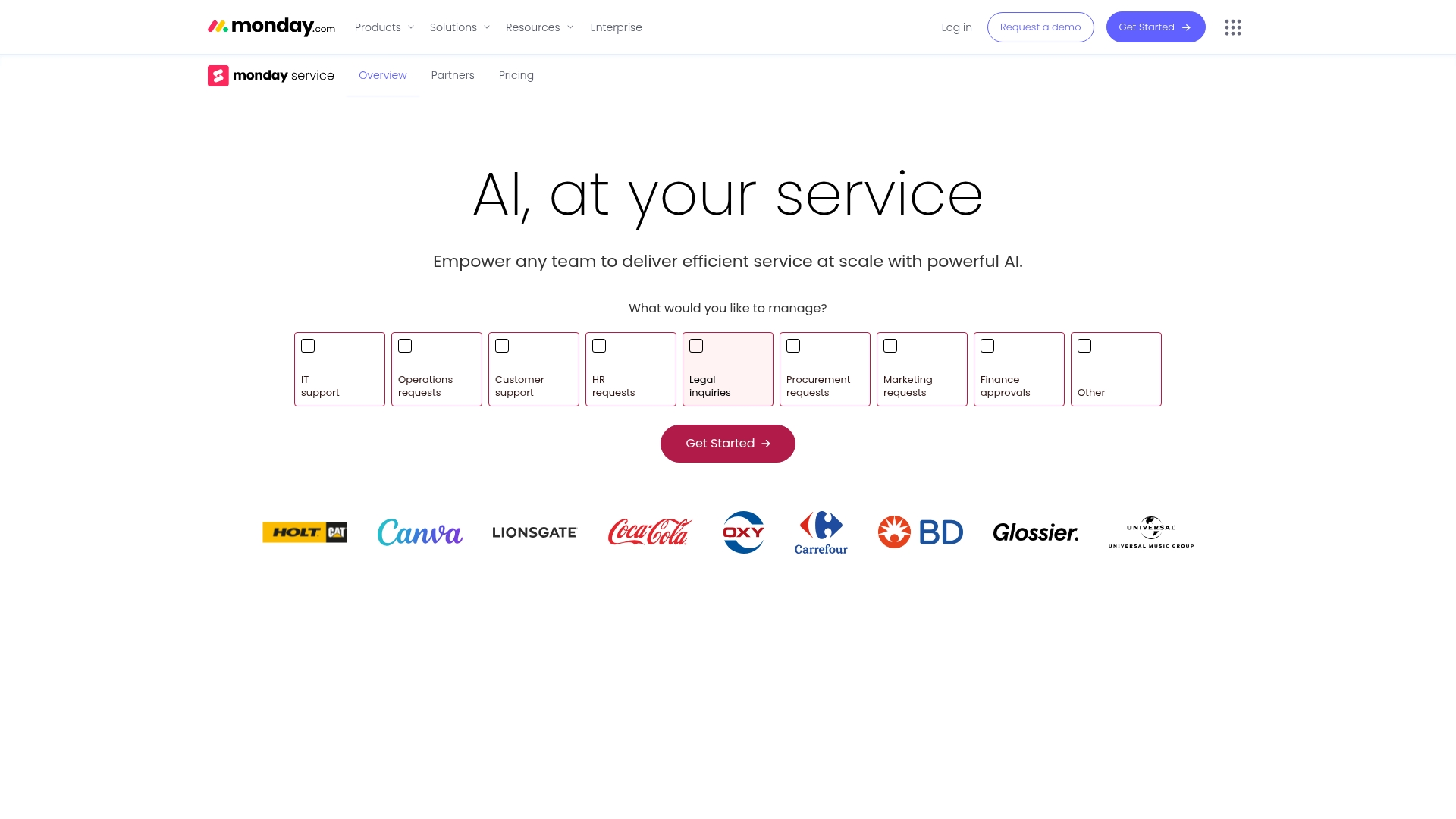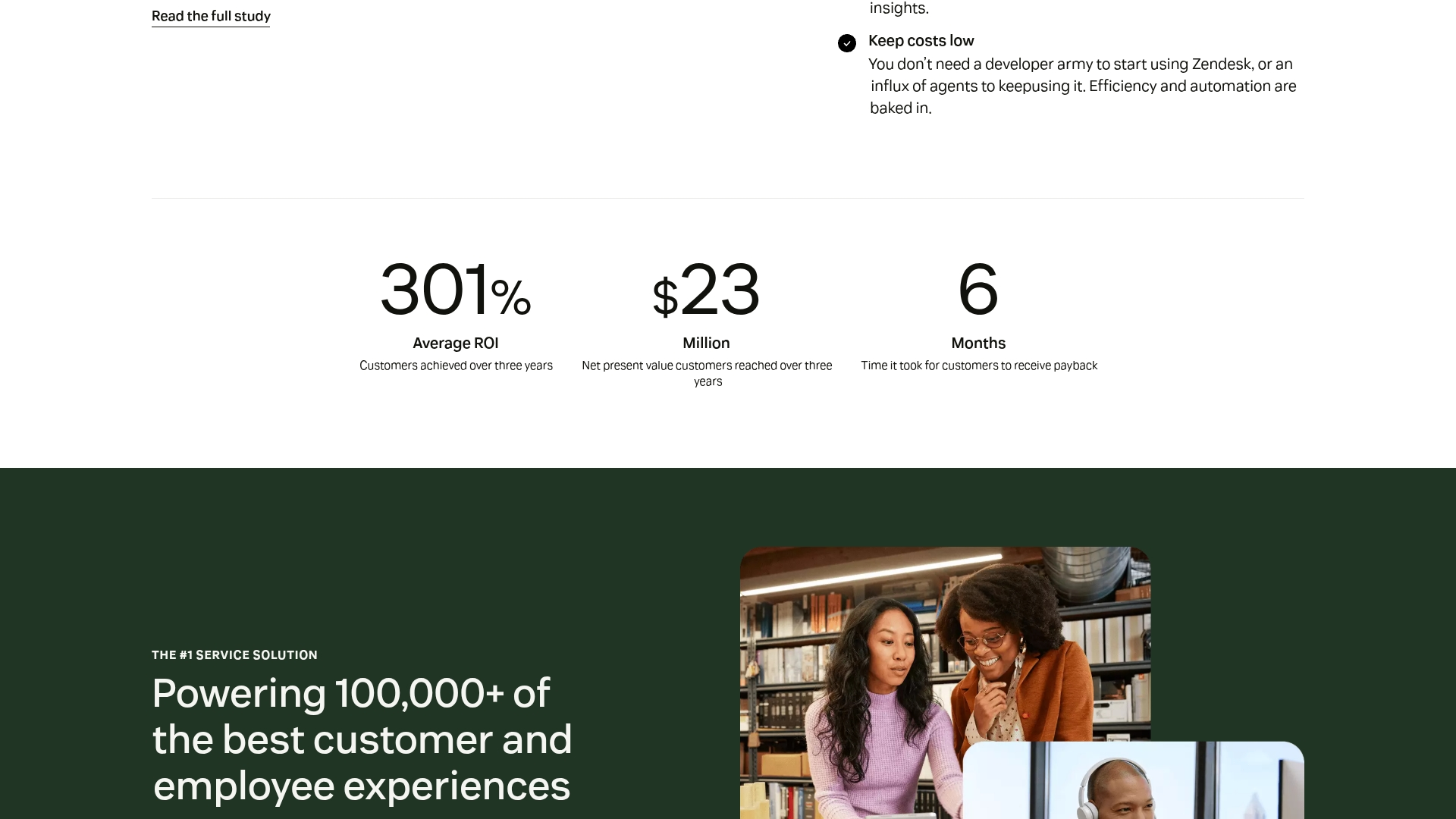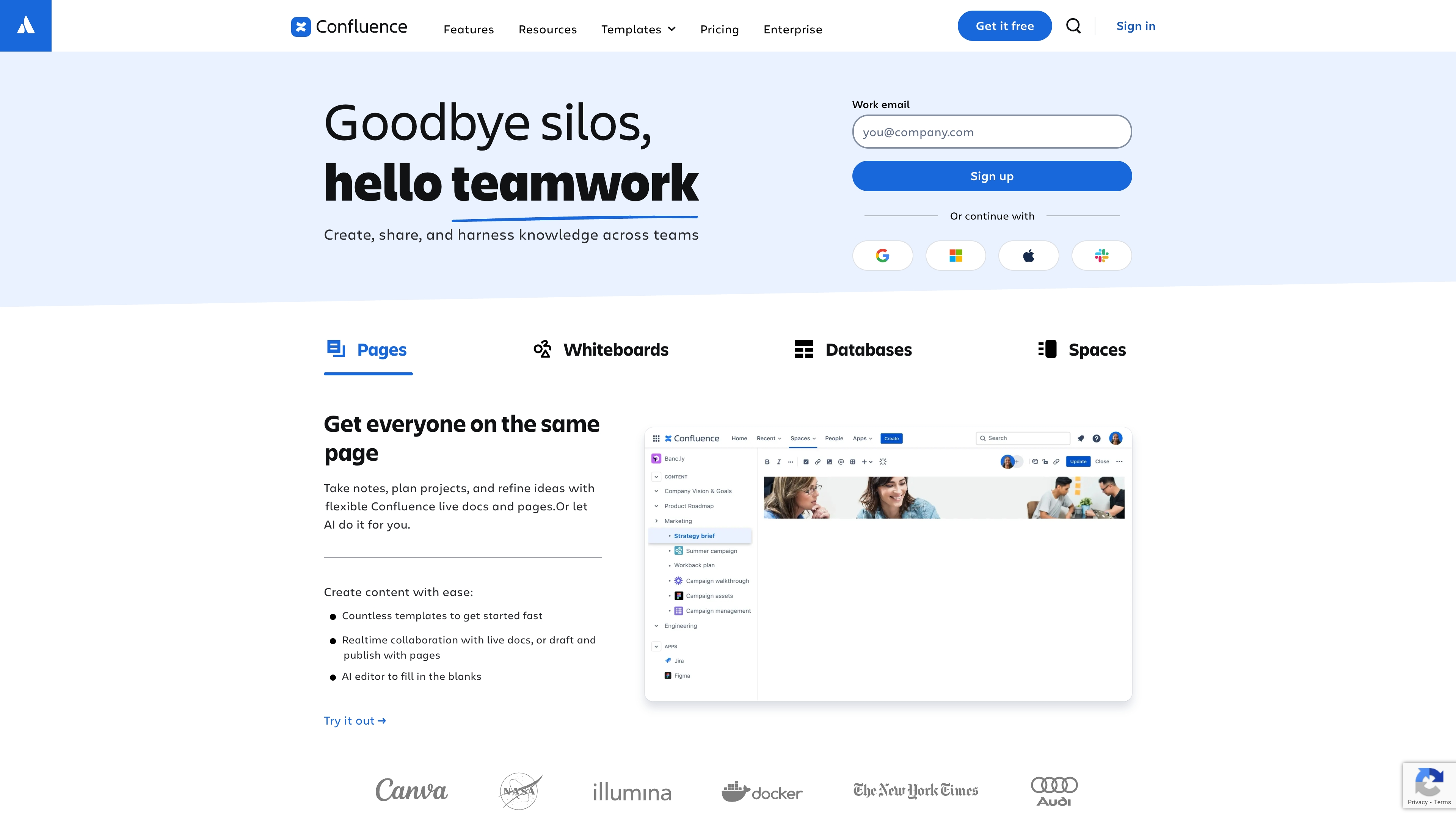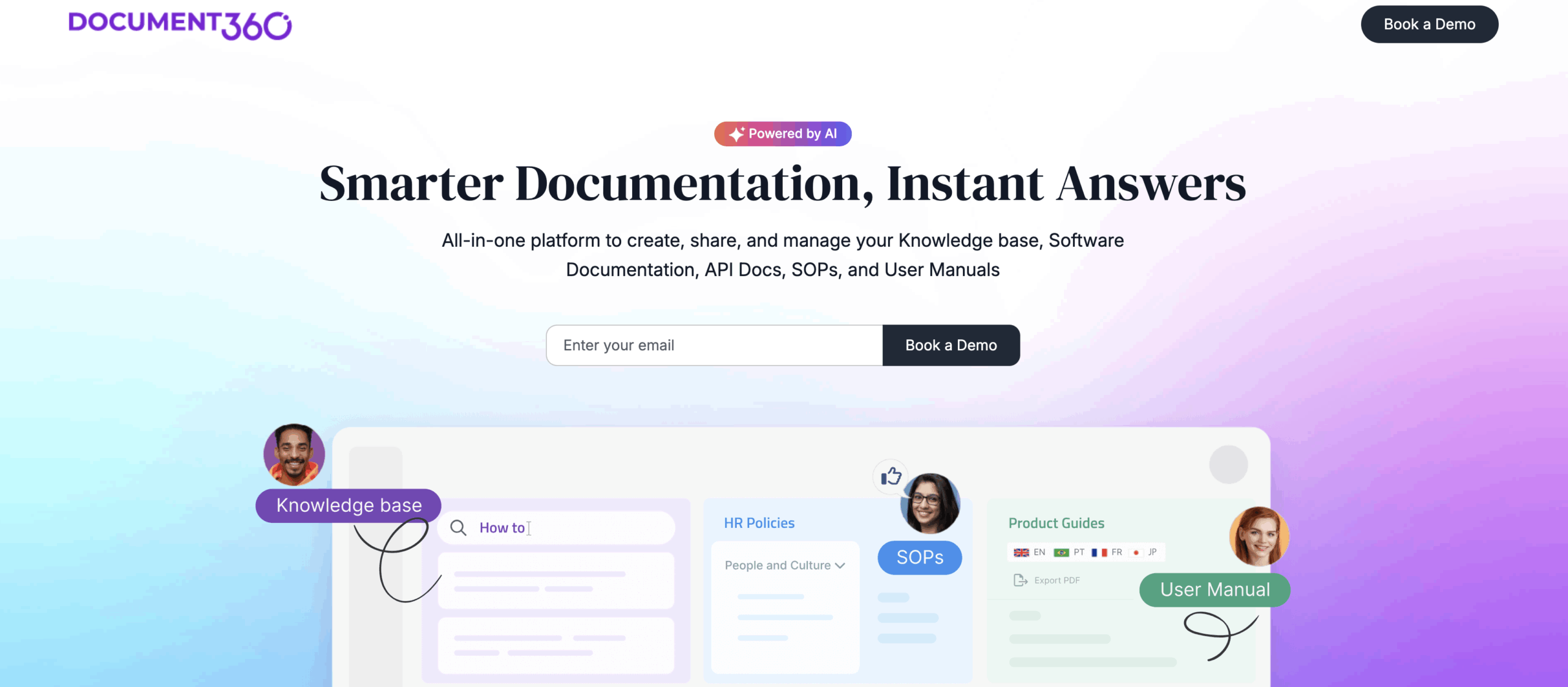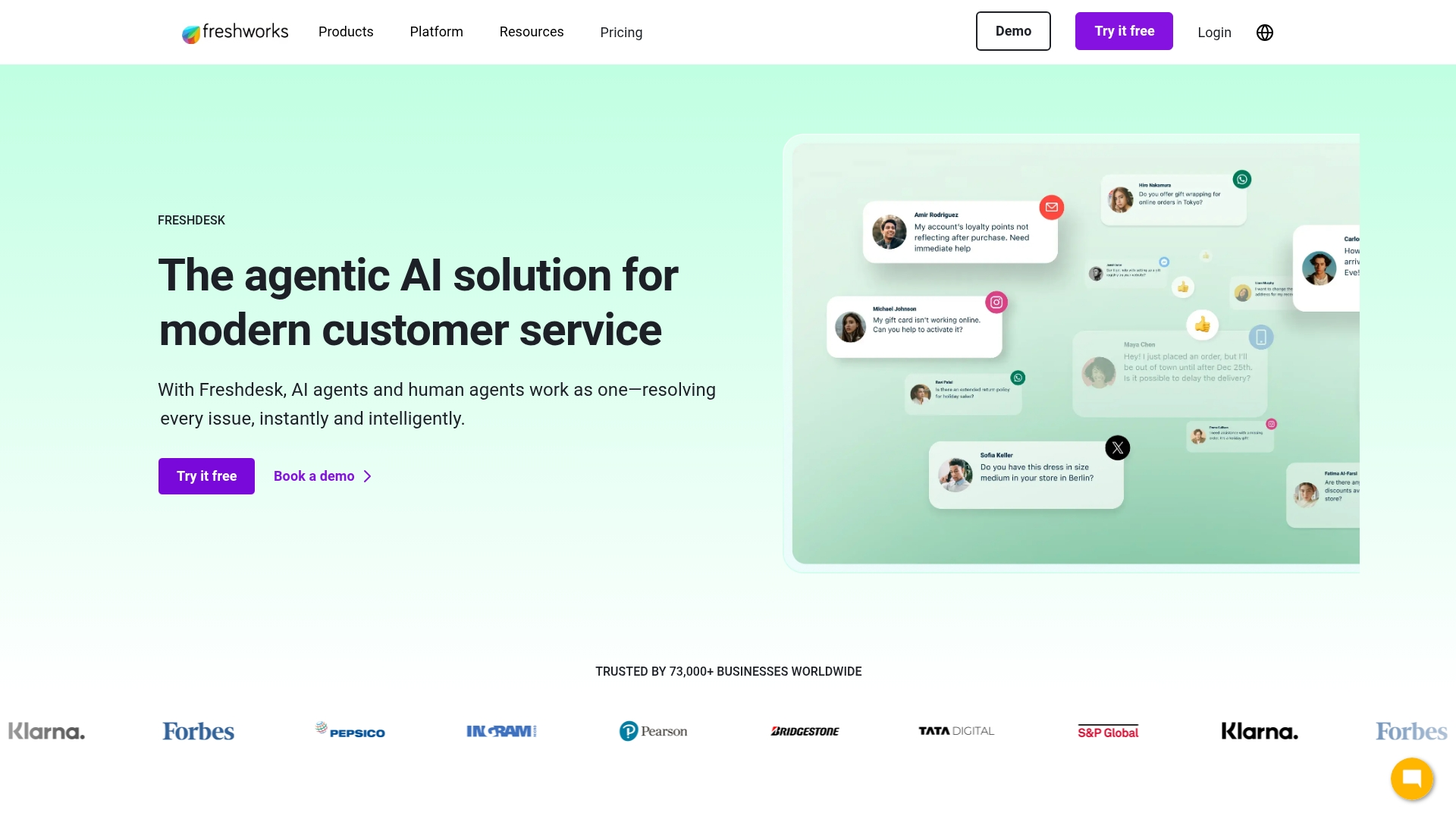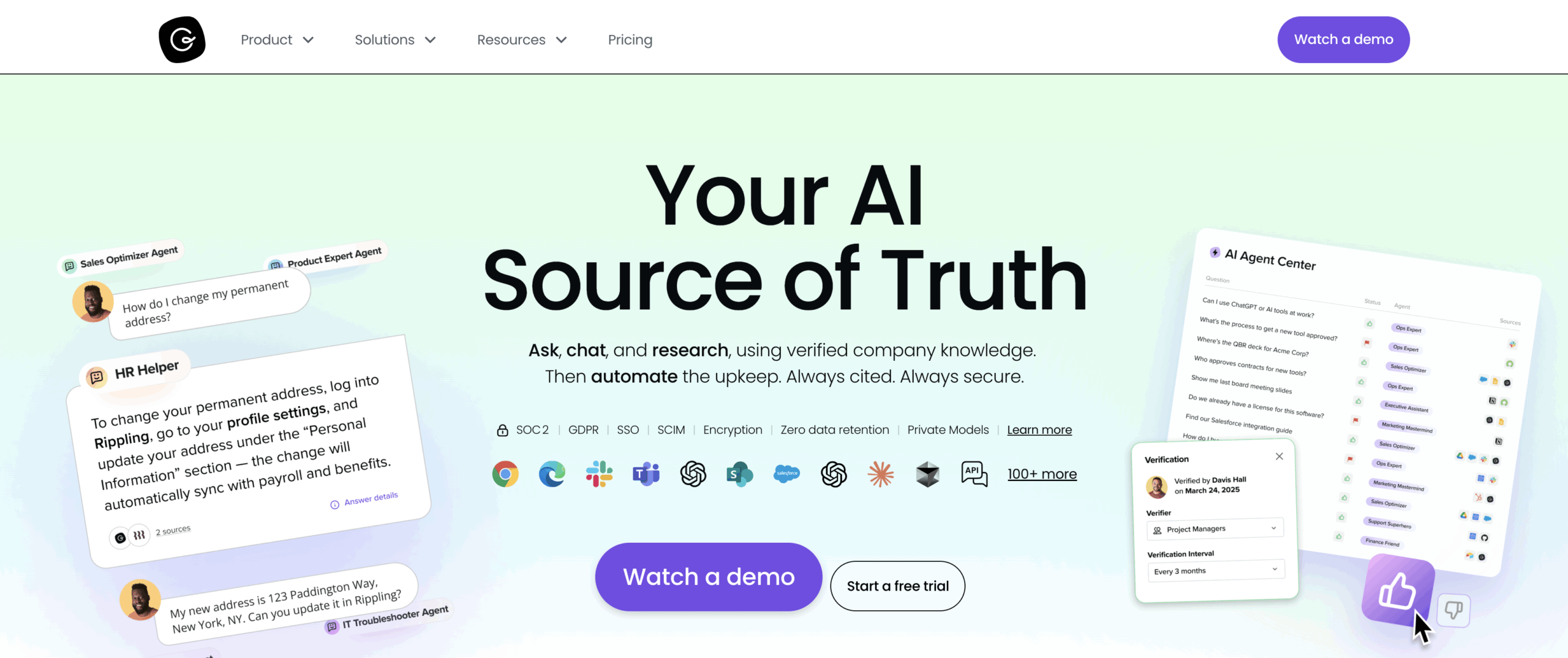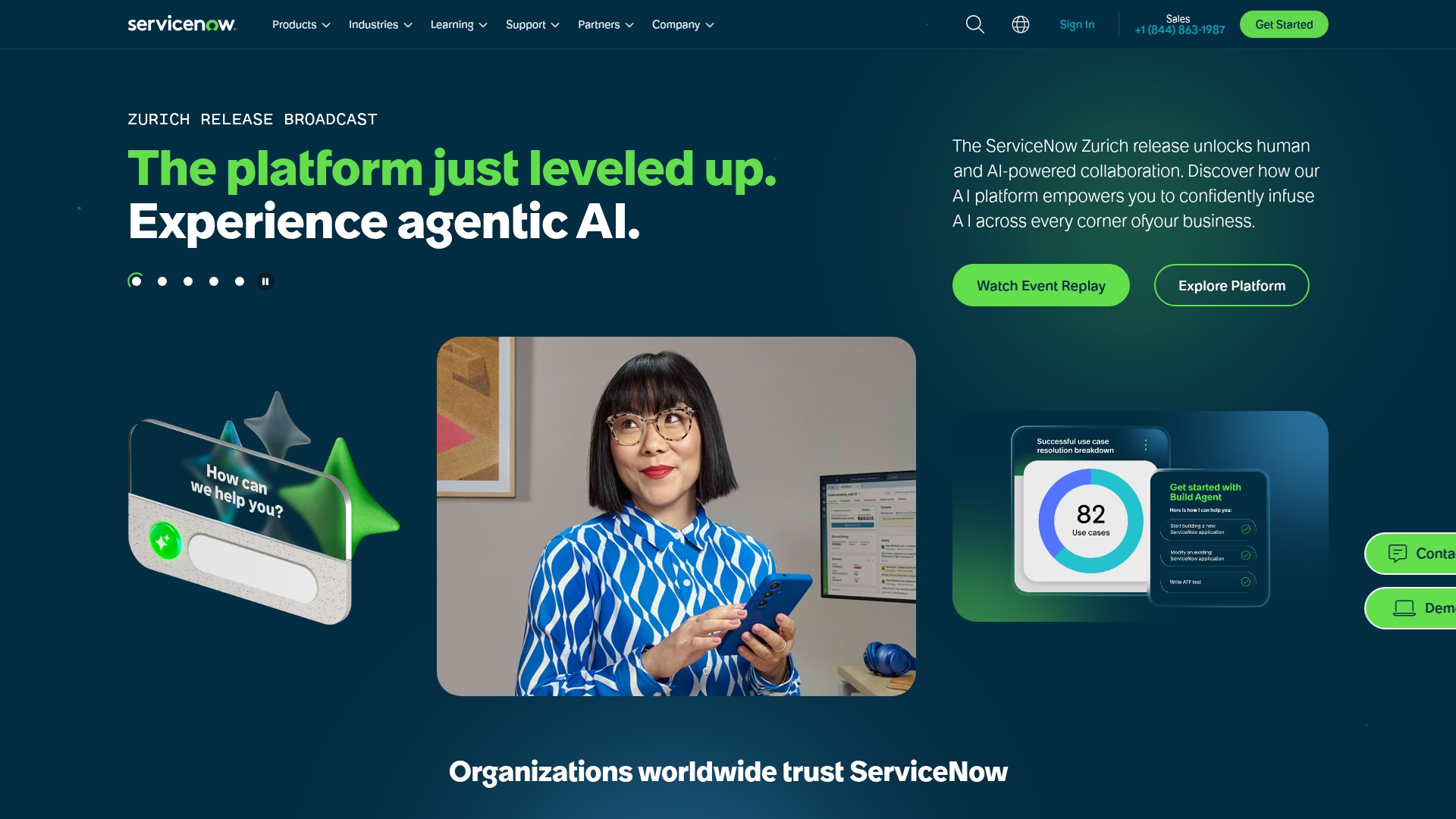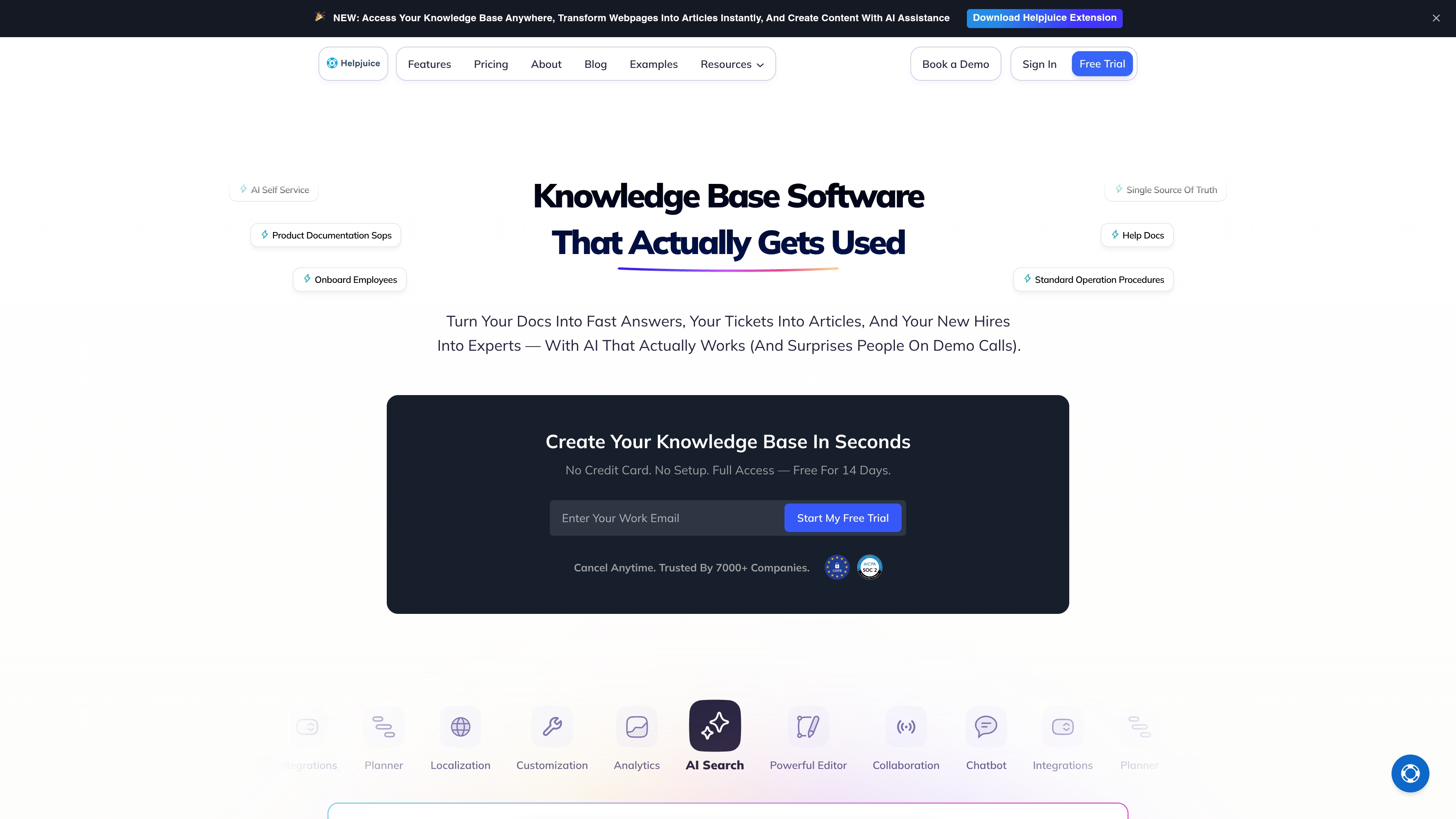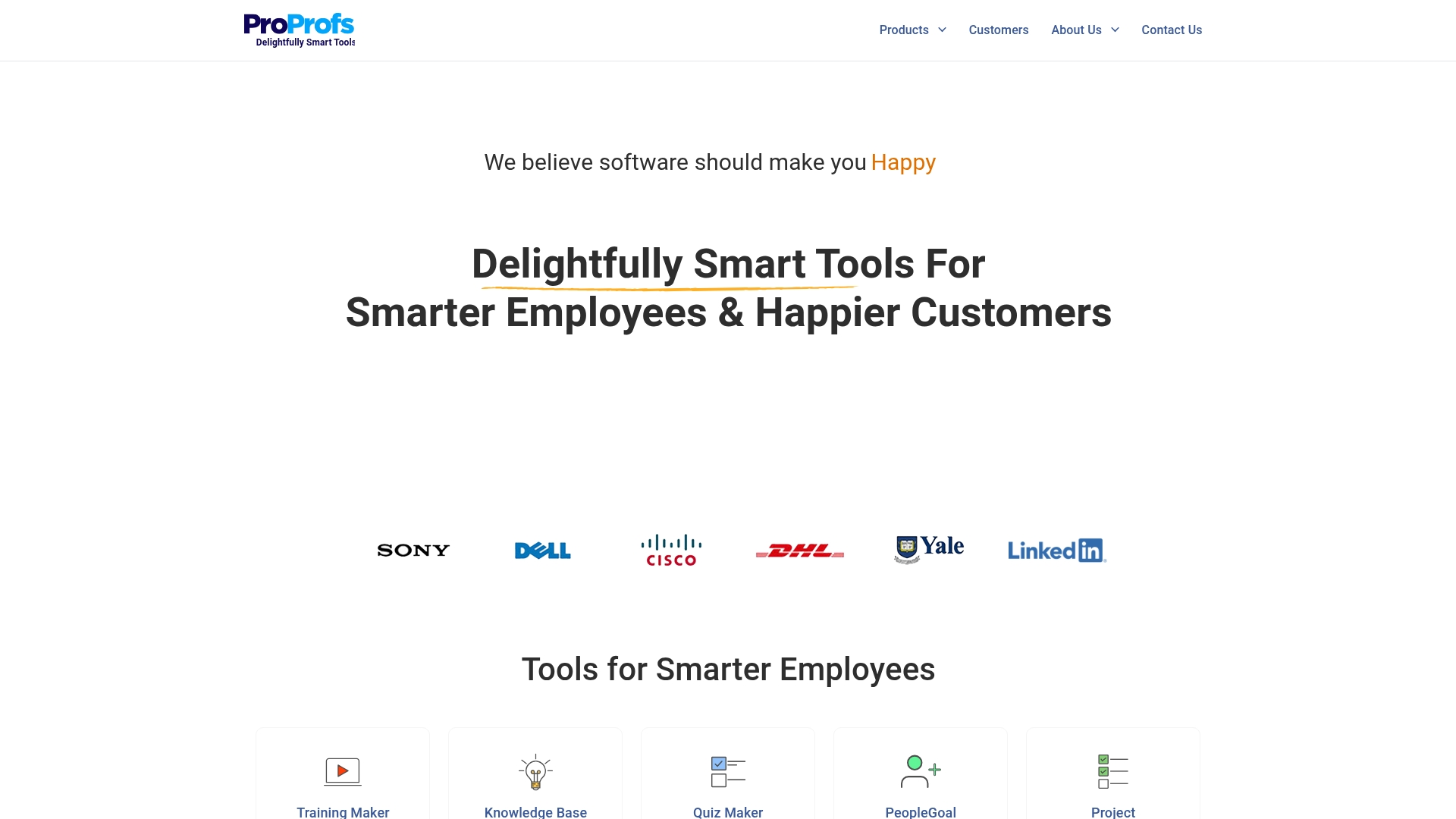Knowledge is a company’s most valuable resource — but in many growing organizations, it’s also the hardest to find. Crucial insights hide in Slack threads, get buried in email inboxes, or live only in the minds of experienced team members. The result is duplicated work, inconsistent answers, and mounting frustration for both employees and customers.
Knowledge base software changes that. It transforms scattered information into a single, reliable source of truth where everyone can find what they need, when they need it. Instead of chasing details or reinventing solutions, teams spend their time solving problems and sharing expertise.
Modern knowledge base systems go far beyond static document storage too: they integrate seamlessly into your workflow, surface the right answers in real time, and even learn from your organization’s activity to grow smarter over time.
In this article, we’ll break down what defines an effective knowledge base system, explore the top platforms shaping 2026, and outline a clear framework for choosing the one that best supports your service operations.
Key takeaways
- Definition & purpose: a knowledge base is a centralized digital repository that holds your team’s collective expertise. It eliminates frustrating searches for documents, providing staff and customers with instant, accurate data when they need it most.
- Impact on service: by transforming scattered information into one powerful, self-service hub, the system dramatically slashes inbound ticket volume. This frees your service agents to focus their energy exclusively on complex, high-value challenges.
- Active integration: a modern knowledge base must be an active workflow partner, not a static library. It needs to integrate directly with your daily tools and ticketing system to automatically provide relevant context and accelerate resolution times.
- The role of AI: built-in AI is essential. It acts as a super-smart teammate, automatically organizing content, suggesting relevant answers, and fueling faster ticket closure through contextual recommendations for agents.
- Organizational benefit: a strong knowledge base is a strategic asset. It rapidly reduces operational costs, speeds up new hire onboarding, ensures consistent customer answers (building long-term trust), and provides 24/7 self-service availability.
What is knowledge base software?
Knowledge base software functions as a centralized digital repository for your team’s collective expertise, a single source for every answer, guide, and piece of crucial information. Its purpose is to replace frantic document hunts with instant, accurate data, building a collective brain that empowers everyone to work more efficiently.
At its core, this software transforms information chaos into effortless clarity for both your team and your customers. By organizing everything from troubleshooting steps to company policies in one searchable digital workspace, it enables agents to find solutions in a flash. The system gives your team and customers the power to solve issues on their own terms.
When integrated with platforms like monday service, your knowledge base becomes the engine for your entire operation. It fuels built-in AI for faster ticket resolution and keeps your team aligned with real-time insights, creating a service experience that feels less like a support queue and more like a highly efficient operation.
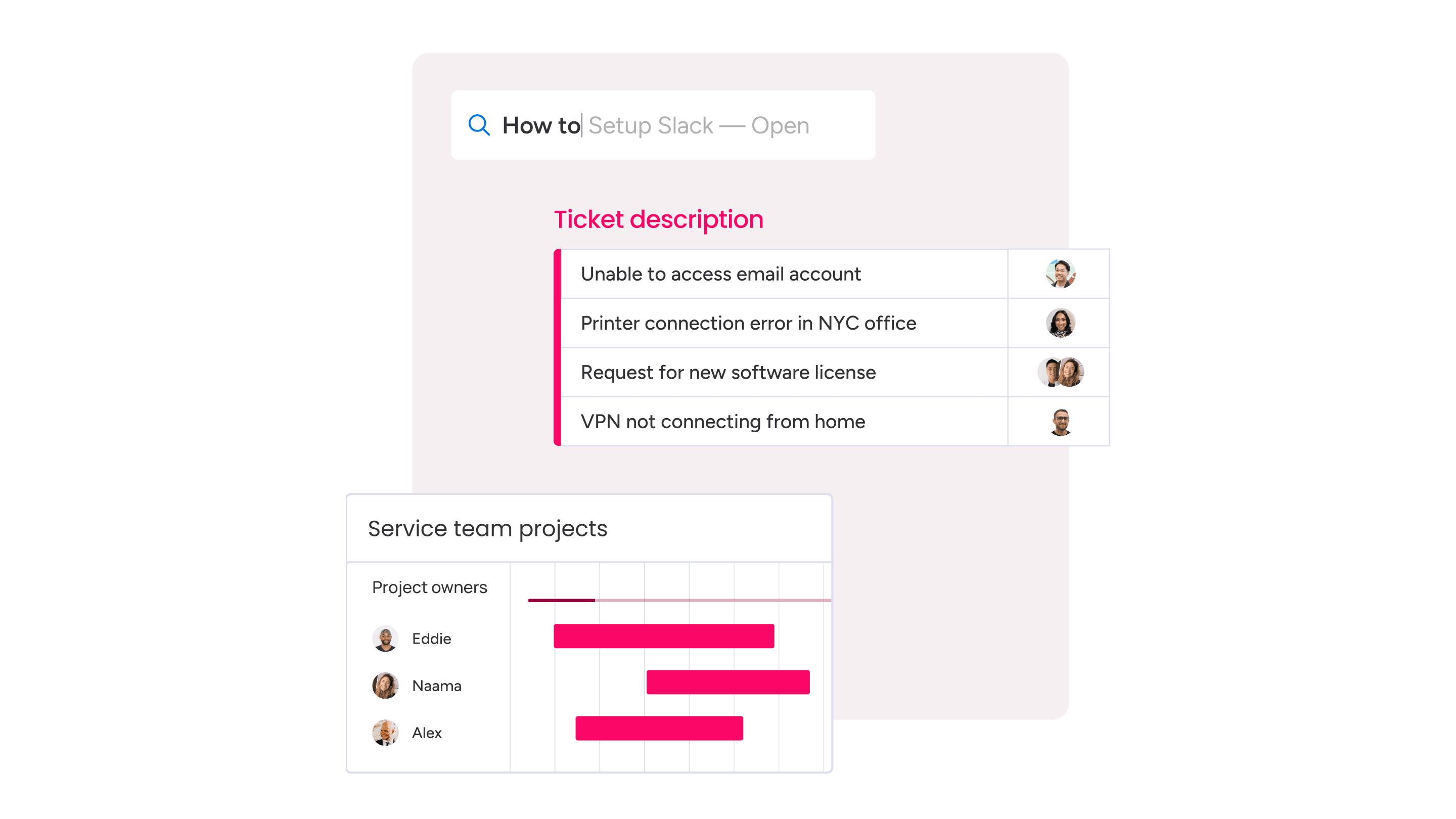
Why a knowledge base is essential for modern service
The impact of a well-structured knowledge base on an organization is profound, creating a reality where teams are free to focus on complex challenges and customers receive immediate assistance. This system converts disorganized information into a powerful, accessible resource for everyone, acting less like a dated library and more like the team’s instantaneous collective intelligence.
Teams can slash their ticket volume simply by empowering customers to find their own answers, which frees up agents to tackle bigger challenges. With platforms like monday service, that knowledge connects directly to your tickets and workflows, so the right answer is always just a click away. This creates a smarter, more connected flow for the entire crew.
A solid knowledge base benefits everyone, from reducing operational costs to getting new teammates up to speed in record time. It ensures every customer gets the same, correct answer, building trust and consistency. The knowledge base functions as your 24/7 engine, consistently making service smoother and ensuring customers get help, around the clock.
The three pillars of an effective knowledge base
An effective knowledge base is more than a digital storage unit. It is the single source of truth that empowers your team. By eliminating endless searching, this go-to digital workspace ensures everyone can find what they need in a snap, allowing your team to spend less time hunting and more time helping.
- Empowering the team: the knowledge base serves as the single source of truth that eliminates endless searching, enabling your team to deliver consistent, top-tier service and spend less time hunting for answers.
- Active partnership: a great platform uses built-in AI to act like a super-smart teammate, automatically organizing info and suggesting answers right inside your workflows. This turns the knowledge base into an active partner that accelerates resolutions through smart automation.
- Operational intelligence: the best platforms connect seamlessly with your existing apps, reflect your brand, and provide clear, real-time analytics. This insight allows you to see exactly what’s working and continuously optimize operations for peak performance, evolving the knowledge base into the engine of your service delivery.
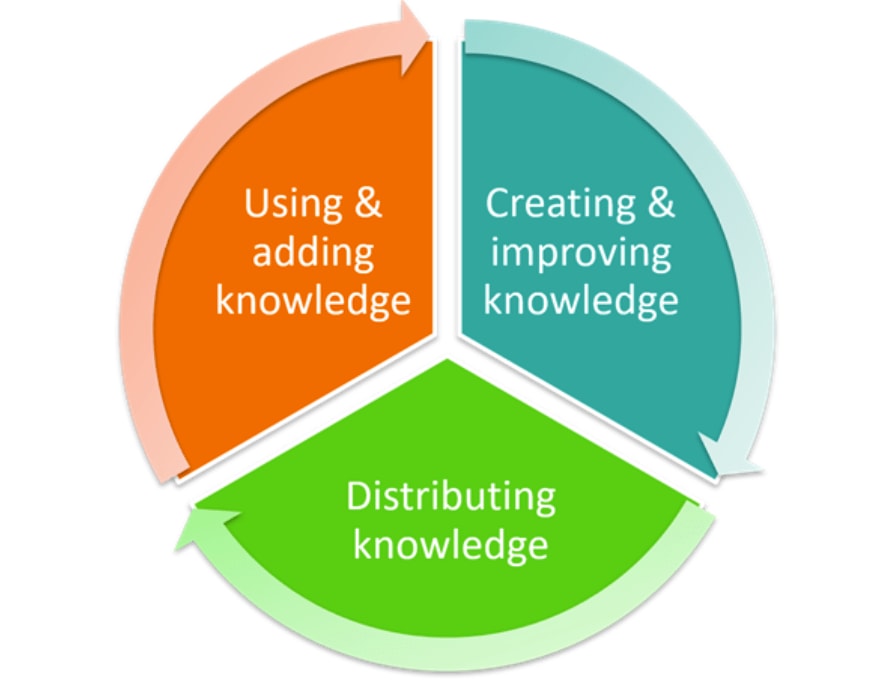
10 leading knowledge base platforms
Selecting the right knowledge base is a critical decision. Instead of getting lost in a sea of features, this info we’ll cover below focuses on what truly moves the needle: empowering your team to find answers fast and get back to delivering amazing service.
We have analyzed the top platforms to see how they truly connect with your workflows, use AI to surface answers instantly, and turn scattered info into your team’s secret weapon for faster resolutions.
Use this as your playbook for finding the perfect fit, helping you build a smarter, more connected service experience from the ground up.
1. monday service
By integrating AI-powered automation with intuitive workflow management, monday Service redefines how organizations approach service operations. The platform specializes in connecting knowledge bases directly to ticketing systems, making it ideal for teams who want to streamline resolution times without sacrificing service quality.
Example: monday Service empowers service teams across IT, HR, legal, and customer support to deliver exceptional service faster through integrated knowledge management and automated ticket resolution.
Key features:
- AI-powered categorization: smart ticket routing automatically assigns issues to the right team members.
- Seamless integration: between knowledge articles and service workflows, allowing agents to access relevant information during ticket resolution.
- No-code customization: lets teams build and adapt their knowledge base without technical expertise.
Pricing:
- Free: enjoy the platform for $0 forever with up to two seats, three boards, and three Docs.
- Basic: $9/month per seat billed annually ($90/month for ten seats).
- Standard: $12/month per seat billed annually ($120/month for ten seats).
- Pro: $19/month per seat billed annually ($190/month for ten seats).
- Enterprise: contact sales for pricing.
- Annual billing: saves 18% compared to monthly billing.
- Minimum requirement: three users.
Why it stands out:
- Deep integration: integrating with the broader monday.com Work OS creates a unified environment where knowledge management connects directly to project workflows and task management.
- Accelerated resolutions with AI: AI capabilities automatically populate ticket labels for urgency, category, and sentiment while pulling relevant knowledge base articles to accelerate resolution times.
- Cross-departmental knowledge sharing: extends knowledge sharing beyond traditional support teams, making it valuable for HR, legal, procurement, and other service functions.
2. Zendesk
At the core of Zendesk’s comprehensive customer service software lies a powerful, AI-driven knowledge base. The platform specializes in mature, enterprise-grade features and extensive third-party integrations, making it ideal for established businesses seeking robust self-service capabilities.
Example: Zendesk empowers organizations to reduce support ticket volume through AI-powered content creation and advanced search capabilities that help customers find answers independently.
Key features:
- AI-driven content creation tools: transform bullet points into full articles and convert support tickets into knowledge base content.
- Generative search functionality: delivers instant answers without manual filtering through semantic understanding.
- Multi-audience support: serving customers, agents, and employees with customizable access controls and localization in over 40 languages.
Pricing:
- Support Team: $19/month per agent (annual) or $25/month (monthly).
- Suite Team: $55/month per agent (annual) or $69/month (monthly).
- Suite Professional: $115/month per agent (annual) or $149/month (monthly).
- Suite Enterprise: $169/month per agent (annual) or $219/month (monthly).
- Automated resolutions included: 5-15 per agent/month depending on plan.
- Additional automated resolutions: $1.50–$2.00 each.
Considerations:
- Per-agent pricing model: can become expensive as teams scale, particularly challenging for growing organizations.
- Native search functionality: has received criticism from users for poor performance, potentially requiring third-party solutions.
3. Confluence
For teams embedded in the Atlassian ecosystem, Confluence provides a seamless, centralized experience for collaboration and documentation. The platform specializes in creating dynamic knowledge bases that integrate deeply with development workflows, making it ideal for software teams and organizations.
Example: Confluence serves as a centralized knowledge hub that seamlessly connects with the entire Atlassian suite, creating an unparalleled end-to-end workflow for teams from initial planning to execution and tracking.
Key features:
- Real-time collaborative editing: with multiple users working simultaneously on documents.
- Extensive template library: with pre-built structures for common documentation needs.
- Native integration with Jira and other Atlassian products: for unified project workflows.
Pricing:
- Free: $0 forever for up to ten users with 2 GB file storage.
- Standard: $5.16 per user/month with 250 GB storage and up to 150,000 users per site.
- Premium: $9.73 per user/month with unlimited storage and 99.9% uptime SLA.
- Enterprise: contact sales for pricing with 99.95% uptime SLA and 24/7 enterprise support.
Considerations:
- Steep learning curve: for non-technical users due to extensive features and configuration options.
- Search functionality: may be slow or return irrelevant results in large, complex instances.
4. Document360
Technical documentation shifts from a complex process to a streamlined, AI-powered one with Document360. Built specifically for teams who need to create both customer-facing knowledge bases and internal documentation, the platform combines intuitive editing tools with powerful AI assistance to help you publish professional documentation faster than ever.
Example: Document360 enables organizations to create comprehensive, searchable knowledge bases that reduce support tickets while empowering both customers and internal teams with self-service capabilities.
Key features:
- AI-powered content generation: uses the “Eddy” assistant for articles, FAQs, and SEO optimization.
- Multiple editor options: accommodates different user preferences and technical skill levels (Markdown, WYSIWYG, Block).
- Advanced analytics and insights: tracks article performance, user engagement, and content gaps.
Pricing:
- Pricing information: visit the Document360 website.
Considerations:
- Real-time collaboration features: less robust compared to platforms like Google Docs, which may slow down team editing workflows.
5. Freshdesk
Unified customer service is the hallmark of Freshdesk, which integrates knowledge base capabilities to streamline support operations. The platform combines ticketing, chat, and self-service content in one system, making it perfect for businesses looking to reduce support volume while improving customer satisfaction.
Example: Freshdesk’s knowledge base integrates seamlessly with its ticketing system, allowing support teams to convert ticket responses into reusable articles while providing customers with 24/7 self-service options.
Key features:
- Unified customer service platform: combines the knowledge base with ticketing and live chat.
- Multilingual content management: with automated response suggestions before ticket submission.
- Real-time collaboration tools: with approval workflows and customer feedback collection.
Pricing:
- Multiple pricing tiers: including a free plan to get you started.
- Pricing information: visit the official pricing page.
Considerations:
- Search functionality: can be inaccurate with larger knowledge bases, making it harder for users to find relevant information.
- Advanced customization options: limited in lower-tier plans, restricting branding and layout flexibility.
6. Guru
By delivering verified information directly into a team’s existing workflow, Guru transforms how knowledge is managed and accessed. The platform specializes in real-time knowledge verification and AI-powered content suggestions, making it ideal for customer support, sales, and distributed teams who need instant access to accurate information.
Example: Guru serves as a centralized knowledge hub that proactively delivers verified information to teams without disrupting their existing workflows.
Key features:
- Knowledge verification system: prompts experts to regularly review and confirm content accuracy.
- Browser extension: provides instant access to information without switching between applications.
- AI-powered suggestions: surface contextual content recommendations based on user roles and current tasks.
Pricing:
- Starter: free for teams with up to three core users.
- Builder: $5 per user/month, offering more features and integrations for growing teams.
- Expert: $10 per user/month, with advanced features like AI-powered search and analytics.
- Enterprise: custom pricing for large organizations needing advanced security and support.
Considerations:
- Additional requirements: consistent manual upkeep and discipline from teams to create, organize, and verify content regularly.
- Search functionality: can struggle without specific keywords, and the platform may become cluttered as content volume grows.
7. ServiceNow
For large organizations requiring robust security and complex automation, ServiceNow offers enterprise-grade knowledge management integrated with IT service management workflows. The platform is built to scale knowledge operations across multiple departments and thousands of users.
Example: ServiceNow Knowledge Management empowers enterprise organizations to increase self-service rates while boosting agent productivity through AI-powered, contextual knowledge that integrates directly into existing ITSM workflows.
Key features:
- GenAI-powered knowledge creation: automatically generates content from closed incidents and other sources.
- Knowledge-Centered Service (KCS) v6 verified methodology: for structured knowledge management and continuous improvement.
- Deep integration with Customer Service Management, IT Service Management, and HR Service Delivery products: for seamless workflow automation.
Pricing:
- Custom pricing: based on your organization’s specific needs and requirements. Contact ServiceNow directly for a tailored quote that reflects your company size, feature requirements, and implementation scope.
Considerations:
- High implementation costs and complex pricing structure: can be prohibitive for smaller organizations.
- Steep learning curve: requires specialized technical expertise for customizations and ongoing maintenance.
8. Helpjuice
Helpjuice provides AI-powered knowledge base software focused on extensive customization and exceptional customer support. This approach makes it ideal for businesses seeking branded, self-service solutions that can reduce support tickets by up to 70%.
Example: Helpjuice empowers businesses to create fully customized, AI-enhanced knowledge bases that enable customers and employees to find answers independently while maintaining complete brand consistency.
Key features:
- AI-powered content creation, search, and chatbot assistance: for instant, contextual responses.
- Extensive customization options: with direct HTML/CSS access for pixel-perfect brand alignment.
- Advanced analytics and reporting: to track content performance and identify knowledge gaps.
Pricing:
- Customized Knowledge Base: $249/month for 30 users with 12 GB storage.
- Customized AI-Knowledge Base: $449/month for 100 users with 24 GB storage and full AI suite.
- Unlimited AI-Knowledge Base: $799/month for unlimited users with 38 GB storage and unlimited customization credits.
Considerations:
- Limited native integrations: compared to competitors may require additional workarounds.
- Pricing structure: counts both content creators and internal viewers as paid users, potentially increasing costs for large internal deployments.
9. Zoho Desk
As a key component of its broader customer service suite, Zoho Desk offers comprehensive knowledge base software that integrates seamlessly across the Zoho ecosystem. This makes it ideal for businesses already invested in Zoho’s business applications, with AI-powered content suggestions and multi-brand support that are particularly valuable for growing companies.
Example: Zoho Desk’s knowledge base empowers organizations to create multilingual, multi-brand help centers that reduce support ticket volume while providing 24/7 customer self-service capabilities.
Key features:
- Multi-brand and multilingual knowledge base creation: with automatic translation into 50+ languages.
- AI assistant Zia: provides automated content suggestions and helps agents find relevant articles during customer interactions.
- Unlimited article storage: with version control, approval workflows, and detailed analytics on article performance.
Considerations:
- Less intuitive help center customization: compared to competitors like Zendesk.
- Possibly slow customer support response: requiring persistence to resolve complex issues.
10. ProProfs
Combining documentation with training and education, ProProfs delivers a versatile knowledge base solution for both public-facing help centers and private internal use. Its intuitive design and multilingual support make it suitable for a wide range of organizations, from small businesses to Fortune 500 companies, looking to reduce support tickets and empower self-service.
Example: ProProfs helps organizations create searchable knowledge bases that reduce customer support tickets by up to 80% while enabling 24/7 self-service for both customers and employees.
Key features:
- AI-powered content creation and search capabilities: including an AI Writer and AI Search.
- Extensive language support: for 90+ languages with manual translation management and multilingual site linking.
- Seamless integration with ProProfs tools: Live Chat, Help Desk, and Survey.
Pricing:
- Free Plan: forever free for small teams and startups, offering core features for up to 25 articles.
- Essentials Plan: $49 per author/month, all features plus AI Writer & AI Search, up to 300 articles.
Considerations:
- Per-author pricing model: can become expensive for larger teams with multiple content creators.
- Limited advanced design customization: beyond the standard branding controls is reported by some users.
How to choose the right knowledge base in 5 steps
The market for knowledge base systems is crowded, making selection a daunting task. You need a platform that simplifies daily tasks by aligning with your team’s natural workflow and scales with your growth, rather than introducing unnecessary complexity.
The true objective is to find a solution that empowers your entire operation, from agents to customers, through instantly accessible information. This choice is an investment in building a smarter, more connected service ecosystem, not just a way to close tickets faster.
Step 1: define your goals
Start by defining your goals. Clarify whether your priority is to empower customers with robust self-service or to equip internal teams to solve problems in record time. Establishing specific, measurable outcomes, such as slashing resolution times or accelerating new hire onboarding, provides a clear target against which to evaluate every platform.
Step 2: evaluate core features
With clear goals, you can focus on the features that truly move the needle. Prioritize the user experience over a long checklist. Your team must be able to create and find information without friction. Exceptional search and an intuitive content editor are non-negotiable, because if knowledge is not easy to access, it might as well not exist.
Step 3: check integrations
An effective knowledge base never works in isolation. Instead, it serves as the central nervous system connecting your entire service operation. Map out how it will communicate with other essential tools, like your ticketing system and CRM, to create a seamless flow of information. The right integrations transform your tech stack into a well-oiled machine, eliminating data silos and giving your team one unified place for answers.
Step 4: assess pricing and scalability
Look beyond the initial price tag to consider long-term value. The best platform is a partner for growth, one that scales with you without introducing surprise costs or frustrating feature walls. You need a flexible foundation that can adapt as you bring on new teams or evolve your service strategy, ensuring this is an investment that pays off for years to come.
Step 5: consider AI capabilities
Modern AI acts as the ultimate teammate, working behind the scenes to make your knowledge base smarter and more effective. It can automate tedious content organization and surface predictive insights, freeing your team to focus on high-impact work. With platforms like monday service, you get AI that delivers real-world results, providing intelligent article suggestions and analytics that help you proactively elevate your service game.
From library to partner: your AI-powered knowledge base
The role of the knowledge base has evolved far beyond a static digital filing cabinet. The future is defined by platforms that actively assist your team, anticipating questions and serving up answers before you even have to ask. This shift means your knowledge base is no longer just a library but an active participant in getting work done.
This is where built-in AI truly shines, becoming a genuine partner for your service desk. The objective is to make finding solutions feel effortless and instant. With platforms like monday service, this is not a far-off concept but a way to operate today. Our AI-powered knowledge base connects directly to your service workflows, turning your team’s collective wisdom into your greatest asset by:
- Assisting with content creation: AI helps your team build and maintain information, ensuring the knowledge base is always current and relevant.
- Anticipating agent needs: predicting what information agents will require next, serving up articles or answers right when they’re needed.
- Enabling conversational search: agents can find answers through simple conversation, eliminating endless, frustrating searching.
- Accelerating resolutions: the system automatically suggests helpful articles right inside a ticket to significantly speed up resolution times.
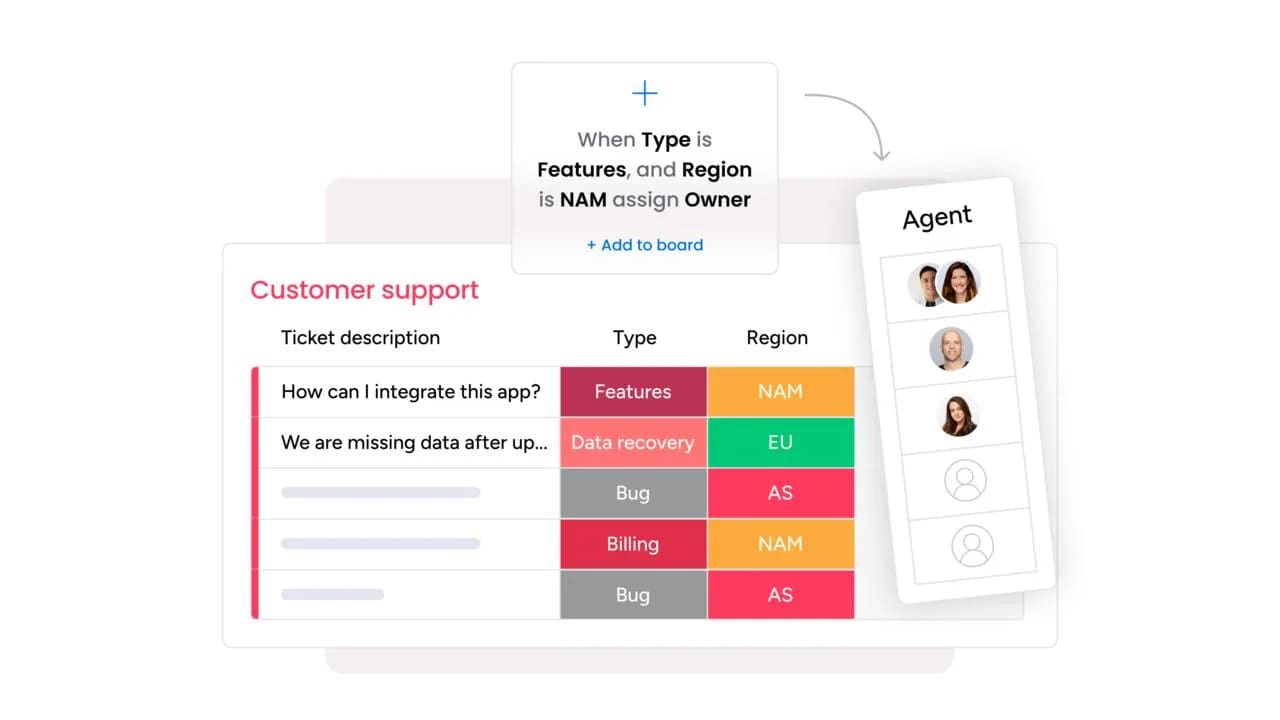
Final thoughts and next steps
The best knowledge base software doesn’t just store information — it puts it to work. When your system is intuitive, connected, and built for collaboration, knowledge becomes an engine that powers your entire organization.
The real transformation happens when knowledge seamlessly integrates with your broader service operations. By connecting documentation, AI tools, and analytics in one workspace, your team gains the clarity and speed to resolve issues before they escalate — turning every challenge into a coordinated success.
monday service brings all of this together in one flexible, no-code platform designed to help teams centralize knowledge, automate routine processes, and act faster. It’s more than a database — it’s the foundation for smarter, more proactive service.
Empower your team with a tool that keeps knowledge flowing and performance growing. Try monday service today and see how effortless excellence can be.
The content in this article is provided for informational purposes only and, to the best of monday.com’s knowledge, the information provided in this article is accurate and up-to-date at the time of publication. That said, monday.com encourages readers to verify all information directly.
Frequently asked questions
What is the difference between knowledge base software and help desk software?
The difference between knowledge base software and help desk software is their primary function. Knowledge base software helps you build and organize self-service information, whereas help desk software is designed to manage incoming support tickets and agent workflows. Modern platforms often combine both into a single, powerful solution.
How does AI-powered knowledge base software improve content management?
AI improves content management by automatically categorizing articles and identifying knowledge gaps. This helps teams reduce manual work and deliver smarter recommendations to users.
Can small teams benefit from internal knowledge base software?
Absolutely. It allows small teams to centralize crucial information and reduce the time spent answering the same questions repeatedly, freeing them up for more impactful work.
What are the advantages of cloud-based knowledge base solutions over self-hosted options?
Cloud-based solutions provide automatic updates, enhanced security, and reduced IT overhead compared to self-hosted options, making them significantly easier to scale and integrate.
How do knowledge base platforms integrate with existing business software?
They typically integrate using API connections, pre-built integrations for tools like CRMs or help desks, and single sign-on (SSO) capabilities to create a unified tech stack.
Are there free knowledge base platforms that include advanced features?
While many platforms offer free tiers with basic features, advanced capabilities like AI automation and detailed analytics almost always require a paid subscription.
